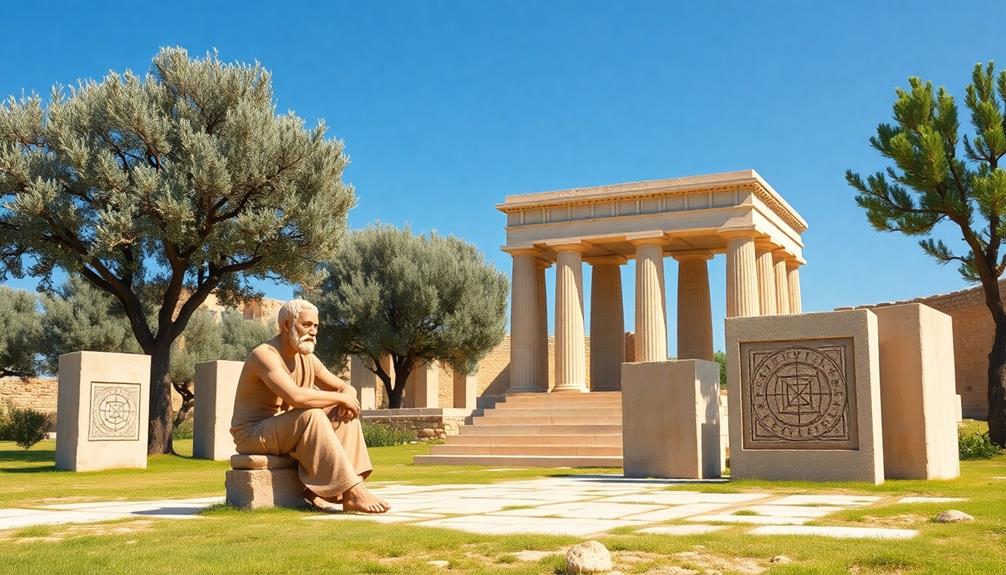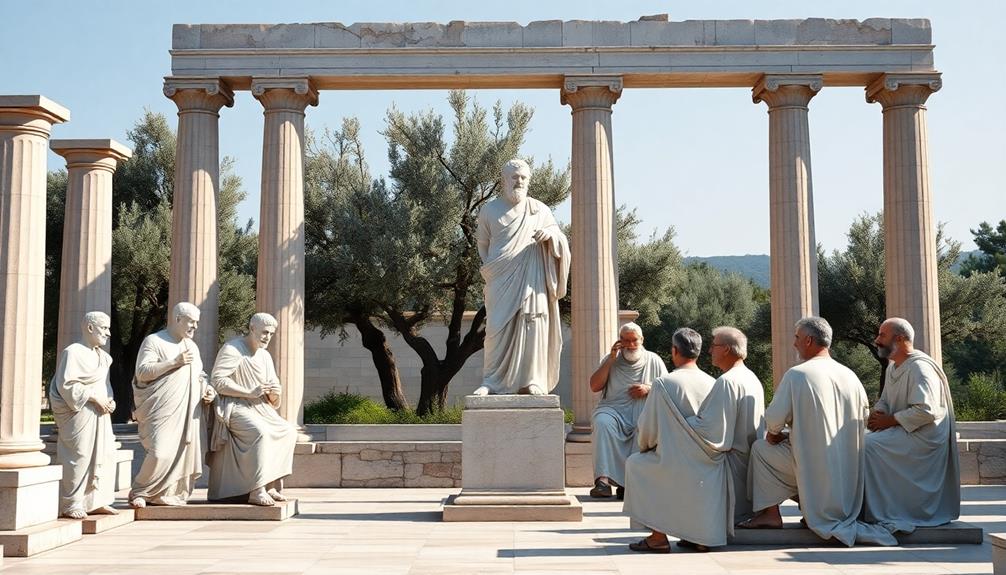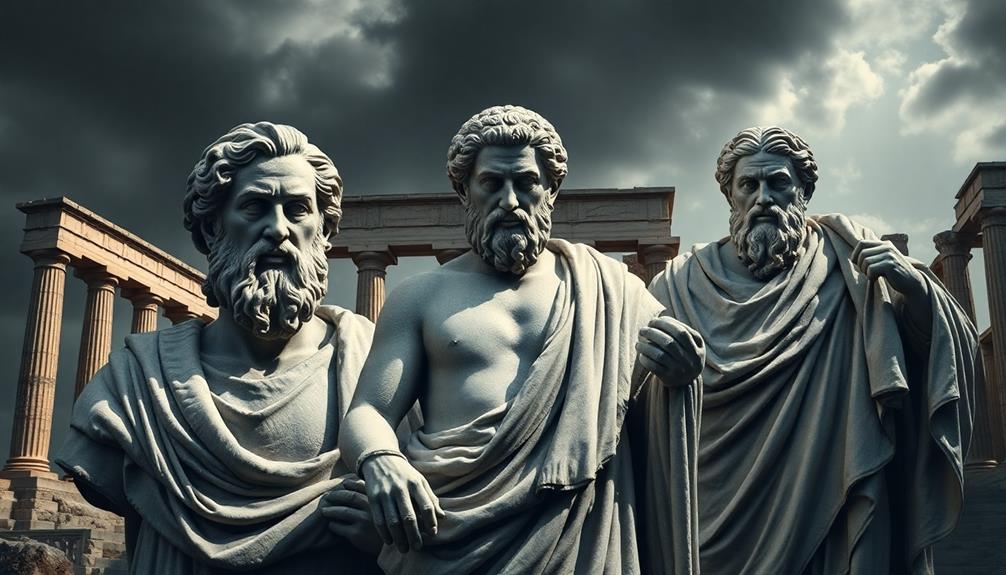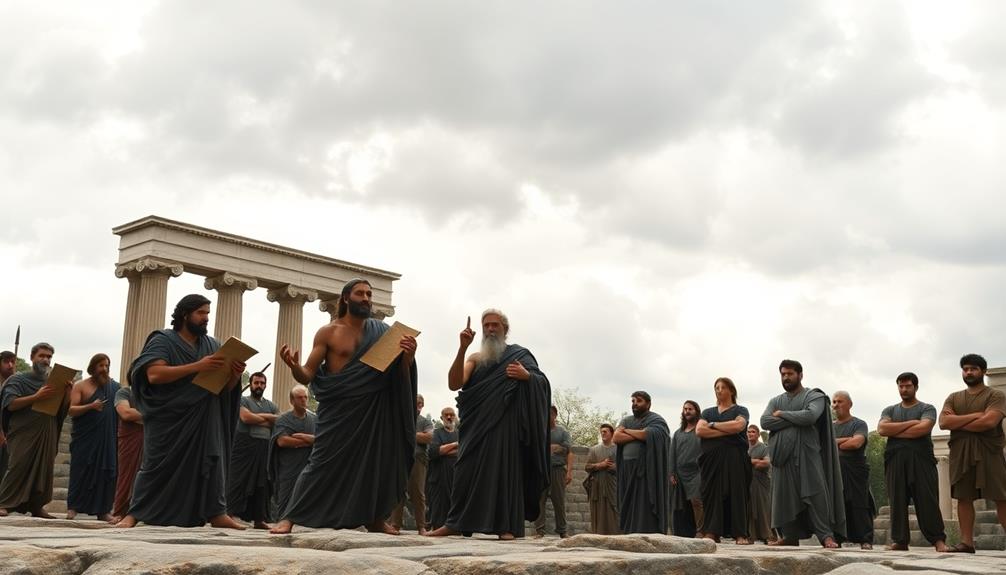Ancient Greek philosophy shapes your understanding of ethics, politics, and personal resilience today. Think about the Socratic method, which encourages questioning norms and fostering dialogue. Aristotle's teachings on virtue ethics remind you to cultivate character for a balanced life. Stoicism offers practical wisdom for maneuvering challenges, suggesting acceptance and personal responsibility. Concepts like democracy stem from Greek thought and highlight civic engagement's importance in a thriving society. The echoes of their ideas resonate in modern discussions and decisions. If you dig deeper, you'll uncover more connections between these ancient insights and contemporary life.
Key Takeaways
- Greek philosophy laid the groundwork for rational inquiry, shaping modern thought in ethics, politics, and science.
- Socratic methods encourage critical questioning, promoting ethical exploration and civic engagement in contemporary society.
- Aristotle's virtue ethics emphasize character development and moral virtue, influencing modern approaches to personal growth and decision-making.
- Stoicism offers practical tools for resilience and emotional regulation, aligning with contemporary psychological practices like cognitive-behavioral therapy.
- The cultural legacy of Greek philosophy enriches language, literature, and education, fostering critical thinking and cultural understanding today.
Origins of Greek Philosophy

Ancient Greek philosophy marks a pivotal shift from myth to reason, laying the groundwork for how we explore existence and knowledge today. It began in the 6th century BCE, with thinkers like Thales and Pythagoras, who introduced rational inquiry to understand the cosmos and human nature. This shift focused on fundamental questions about reality, exploring concepts like 'arche'—the fundamental principle that underpins existence.
As you investigate deeper, you'll encounter key figures like Socrates, whose dialogues emphasized ethics and self-examination, challenging you to think critically about your values.
Plato, a student of Socrates, expanded on these ideas, examining politics and the ideal state in works like "The Republic."
Aristotle, Plato's student, took a more empirical approach, laying the groundwork for metaphysics and systematic inquiry that still influences disciplines today.
The emphasis on rational thought in Ancient Greek philosophy has shaped not only philosophy itself but also ethics, politics, and even science.
Influential Philosophers and Their Ideas

Throughout history, influential philosophers have shaped our understanding of knowledge, ethics, and existence. Ancient Greek philosophers laid the philosophical foundations that still inform our world today.
Take Socrates, for instance; his Socratic method emphasized questioning and dialogue, which is essential for exploring ethical issues and moral understanding.
Plato followed, proposing his theory of Forms, suggesting that non-material abstracts represent the most fundamental reality, influencing contemporary metaphysics and epistemology.
Aristotle's contributions are equally significant. His systematic approach to logic, ethics, and political theory remains relevant in various fields, including science and governance. His insights help you navigate complex moral dilemmas and understand human behavior better.
Zeno of Citium introduced Stoicism, stressing natural rights that have profoundly affected modern legal and political thought regarding individual rights.
Meanwhile, the inquiries of thinkers like Pythagoras and Heraclitus spark ongoing debates about identity, reality, and change in today's society.
Democracy and Civic Engagement

Engaging in civic life has always been essential for a thriving democracy, a principle championed by philosophers like Socrates and Plato. They laid the groundwork for modern democratic practices, emphasizing that active participation by citizens is fundamental.
The Socratic method, with its focus on critical questioning, encourages you to think deeply about societal norms and injustices, fostering a culture of civic engagement. Just as witty literature quotes can spark insightful conversations, philosophical dialogues can invigorate public discourse and inspire collective action literary references can enhance credibility.
Plato's vision of the ideal city in "The Republic" showcases how citizens should play an important role in governance. He argued for educated and virtuous leaders who prioritize the common good, reminding us that democracy thrives when citizens are informed and engaged.
Aristotle also underscored the importance of participation, asserting that true happiness comes from being involved in public affairs and contributing to a just society.
These philosophical discussions from ancient Greece still resonate today, reinforcing the idea that your involvement in civic matters isn't just a right but a responsibility. By participating actively, you help maintain a healthy democracy, ensuring that the principles of justice and equality remain central to our collective governance.
Ethics and Moral Philosophy

When you explore ethics and moral philosophy, you'll find that the foundations of virtue ethics, laid by Aristotle, still resonate in today's discussions about character and the good life.
Additionally, the principles of Stoicism offer valuable insights into resilience and personal responsibility in the face of modern challenges.
These ancient ideas can guide your understanding of ethical living in a complex world.
Foundations of Virtue Ethics
Virtue ethics, rooted deeply in ancient Greek philosophy, underscores the importance of character in ethical living. This approach emphasizes the cultivation of moral virtues as essential for achieving eudaimonia, or human flourishing.
Aristotle, in his "Nicomachean Ethics," argues that virtues are habits that guide us toward a balanced life. He introduces the concept of the Golden Mean, suggesting that moral virtues exist between extremes, promoting moderation in ethical behavior.
Plato's exploration of justice in "The Republic" further highlights the significance of virtue not only for individuals but for society as a whole. By developing strong character, you contribute to a harmonious community.
This foundational philosophy remains relevant today, as contemporary discussions on moral philosophy often circle back to the role of character development and virtues in ethical decision-making.
In a fast-paced world, virtue ethics offers a framework for maneuvering through moral dilemmas by focusing on the qualities that define a good person.
Modern Relevance of Stoicism
Stoicism offers a powerful lens through which to navigate the complexities of modern life. Founded by Zeno of Citium, this ancient philosophy emphasizes virtue as the highest good, advocating for resilience and moral integrity amidst challenges.
You'll find that key figures like Seneca and Marcus Aurelius stress the importance of self-control and rationality, ideas that resonate strongly with today's self-help movements focused on mindfulness and emotional regulation. In the process of coping with loss or separation, the Stoic practice of reflecting on one's emotions can be particularly beneficial, highlighting the significance of acknowledging feelings during difficult times, as seen in processing loss.
The Stoic principle of "amor fati," or love of fate, encourages you to accept what's beyond your control, providing a solid framework for coping with uncertainty and adversity in our fast-paced world. This mindset not only supports personal growth but also fosters a sense of ethical responsibility toward others.
Moreover, Stoicism's emphasis on universal brotherhood promotes a sense of community, which is vital in addressing today's societal polarization and conflict resolution.
Modern interpretations, like those from David Fideler, continue to bring Stoicism into the contemporary context, offering practical guidance for ethical living. By embracing these Stoic principles, you can cultivate a more resilient and meaningful life.
Stoicism's Timeless Relevance

In today's fast-paced world, the teachings of Stoicism offer a compelling framework for steering through life's challenges. By emphasizing virtue and inner character, Stoicism teaches you that true happiness (eudaimonia) comes from aligning with nature and reason. Key figures like Seneca, Epictetus, and Marcus Aurelius provide insights on developing emotional resilience, which you can apply to your daily life.
Here's a quick overview of Stoicism's relevance today:
| Stoic Concept | Modern Application |
|---|---|
| Virtue | Ethical living in personal choices |
| Happiness | Finding joy through self-discipline |
| Emotional Resilience | Coping strategies in tough situations |
| Personal Development | Continuous self-improvement |
| Universal Brotherhood | Enhancing empathy in a polarized world |
As you explore Stoicism, you'll notice its principles align closely with modern psychological practices like cognitive-behavioral therapy, reinforcing its impact on mental health. By embracing Stoicism, you can cultivate a mindset that not only navigates challenges but also enhances your personal growth and well-being.
The Impact of Pythagorean Thought

Pythagorean thought reveals the profound connection between numbers and the universe, shaping how you perceive reality.
Its emphasis on mathematical harmony influences not only philosophy but also modern scientific and artistic endeavors.
Mathematical Harmony in Universe
Mathematical harmony pervades our understanding of the universe, a concept first articulated by ancient thinkers like Pythagoras. This idea laid the philosophical foundations for viewing numbers as not just abstract concepts but as carriers of intrinsic properties that shape reality.
Pythagorean thought emphasizes that the universe is ordered and beautiful, guiding our pursuit of truth and knowledge.
Here are three key aspects of Pythagorean thought that illustrate this harmony:
- Mathematical Relationships: The Pythagorean theorem exemplifies how geometric principles reveal deeper truths about the universe, showcasing relationships between the sides of right triangles.
- Aesthetic Proportions: Pythagorean principles extend beyond mathematics into art and architecture, where ratios create aesthetically pleasing designs that resonate with our sense of beauty.
- Influential Legacy: The impact of Pythagorean thought continues to echo in modern disciplines, influencing areas like music, where harmony relies on mathematical ratios to create pleasing sounds.
Influence on Modern Thought
Throughout history, the influence of Pythagorean thought has profoundly shaped modern philosophical and scientific discourse. His introduction of the concept of "kosmos" emphasized the mathematical structure and harmony of the universe, laying the groundwork for mathematical philosophy that later influenced thinkers like Plato and Aristotle.
You can see how Pythagorean principles of balance and order have permeated not just ancient aesthetics but also Renaissance art and architecture, where harmony became essential.
Moreover, Pythagorean thought introduced the idea of metempsychosis, or the transmigration of souls, which considerably impacted ethical and spiritual discussions regarding the nature of the soul. His ideas continue to resonate in modern contexts, prompting ongoing debates about ethics and spirituality.
The enduring significance of Pythagorean thought is evident in contemporary discussions about the relationship between mathematics, beauty, and the natural world, highlighting its influence on modern science.
Political Philosophy and Virtue

Exploring the depths of ancient Greek political philosophy reveals a profound connection between virtue and the creation of a just society.
Plato and Aristotle emphasized that the cultivation of virtues is essential for achieving justice and promoting societal well-being. Their insights remain significant in today's discussions on democracy and ethical governance.
As we navigate contemporary challenges, fostering a growth mindset can empower citizens to engage meaningfully with these philosophical principles.
Consider these key aspects:
- Cardinal Virtues: Plato's "Republic" highlights wisdom, courage, moderation, and justice as foundational to ethical behavior in governance, guiding leaders to act rightly.
- Eudaimonia: Aristotle advocates for a political structure that fosters happiness through the development of virtue among citizens, linking individual fulfillment to collective well-being.
- Civic Engagement: Ancient Greek philosophers stressed the importance of unity and community, which resonates with contemporary calls for active participation in democratic processes.
The relevance of these philosophies is evident in modern political discourse.
By recognizing the relationship between virtue and justice, you can appreciate how ethical behavior shapes effective governance, influencing expectations for public officials today.
Engaging with these ideas enhances your understanding of civic responsibility and the essential role of virtue in fostering a just society.
Language and Cultural Legacy

The influence of ancient Greek thought extends beyond political philosophy to shape our language and cultural legacy. Over 150,000 English words have Greek origins, highlighting how deeply the Greek language permeates modern vocabulary. Terms like "democracy" and "idiosyncrasy" aren't just words; they're reflections of the philosophical ideas introduced by ancient philosophers. These terms continue to resonate in contemporary discussions, illustrating the lasting impact of Greek thought on our communication.
Moreover, Greek myths remain significant in modern literature, with authors like C.S. Lewis weaving these ancient narratives into their works. This integration keeps the cultural legacy of Greece alive, making it relevant in today's world. In educational settings, these myths enhance critical thinking and cultural studies, serving as foundational elements in Western education.
Even in the commercial sphere, companies like Amazon and Olympus draw inspiration from Greek mythology, showcasing the ongoing relevance of Greek culture. This rich tapestry of language and myth not only informs our vocabulary but also enriches our understanding of philosophy, ensuring that the legacy of ancient Greece thrives in modern society.
Modern Interpretations of Myths

Modern adaptations of Greek myths breathe new life into these ancient stories, making them relevant for today's audiences. By reimagining these narratives, they connect timeless human experiences with contemporary issues. You can see this in various forms of media that highlight themes such as heroism and moral dilemmas.
Here are three notable examples of modern interpretations:
- Literature: The "Percy Jackson" series cleverly blends Greek mythology with modern storytelling, engaging young readers and sparking interest in ancient tales.
- Film: Movies like "Clash of the Titans" and "Wonder Woman" showcase mythological characters, emphasizing their influence in popular culture while addressing themes of identity and conflict.
- Educational Resources: Programs like the Greek Mythology Diploma Course use these myths to enhance critical thinking and cultural understanding, proving their ongoing educational value.
Through these modern adaptations, Greek mythology remains a powerful tool for exploring complex issues. They not only entertain but also encourage deeper reflection on our values and beliefs, ensuring these ancient tales continue to resonate with new generations.
Frequently Asked Questions
Why Is Greek Philosophy Important Today?
Greek philosophy's important today because it shapes your understanding of ethics, politics, and justice. Its teachings encourage critical thinking, promote personal development, and foster a sense of responsibility, helping you navigate modern challenges and complexities.
Why Is Ancient Greek Psychology Still Valuable Today?
Imagine wandering through Plato's cave, shadows dancing on the walls. Ancient Greek psychology helps you understand those shadows, guiding your journey toward self-knowledge, emotional intelligence, and rational thought—crucial tools for personal growth and mental well-being today.
How Are the Beliefs of the Ancient Greek Philosophers Still Applied in Psychology Today?
You'll find that ancient Greek philosophers' beliefs shape modern psychology through self-reflection, virtue ethics, and the Socratic method. These ideas encourage you to understand yourself, manage emotions, and think critically in therapeutic settings.
What Is the Impact of Greek Philosophy in the Society?
Greek philosophy shapes your society by influencing democratic principles, ethical frameworks, and educational practices. It encourages critical thinking and dialogue, helping you navigate moral dilemmas and appreciate harmony in art and architecture.
Conclusion
In exploring ancient Greek philosophy, you'll find its ideas resonate profoundly today. Did you know that over 70% of Americans believe ethics and morality are essential in guiding their decisions? This statistic highlights just how relevant these ancient discussions remain in our lives. By engaging with the thoughts of philosophers like Socrates and Aristotle, you not only deepen your understanding of ethics and democracy but also enrich your own perspective on modern challenges. Embrace this timeless wisdom!









